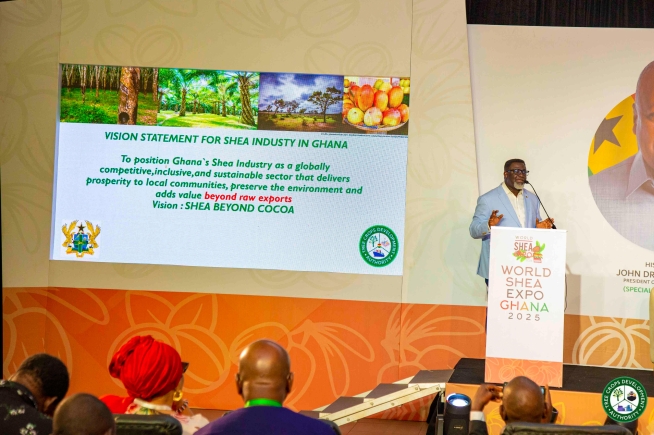The Chief Executive Officer of the Tree Crops Development Authority (TCDA), Dr Andy Osei Okrah, has urged stronger collaboration among stakeholders to transform Ghana’s shea industry into a multi-billion-dollar driver of national economic growth.
Speaking at the closing ceremony of the 2025 World Shea Expo in Tamale, Dr Okrah stressed that the sector’s success would depend on forging synergies among government institutions, development partners, private investors, traditional leaders, researchers, and value chain actors.

“The vision for the shea sector goes beyond cocoa,” he said. “With the right regulations, licensing, and policy frameworks, we can unlock the full potential of the shea industry and position it as one of the pillars of Ghana’s economy.”
The shea sector is one of six strategic tree crops under the TCDA, and Dr Okrah emphasised its potential to generate billions of dollars annually through value addition and industrialisation. He explained that the TCDA’s Shea Sector Plan is in line with President John Dramani Mahama’s Agriculture for Economic Transformation Agenda, which prioritises production, processing, and job creation.
Dr Okrah appealed to all actors in the value chain to “join hands with TCDA to build a sustainable shea industry by 2030.” According to him, the plan aims to empower women, expand opportunities for youth, and create thousands of jobs, particularly across the northern regions.
He announced that the Authority was collaborating with the National Service Authority to encourage young people to go into shea cultivation. “By planting more trees and boosting productivity, we can secure the future of the shea industry,” he said.
Dr Okrah also revealed ongoing efforts with other state institutions to support women who dominate nut-picking activities with tricycles, personal protective equipment (PPEs), and other logistical tools. “We are committed to providing the right tools and support so that women can increase their productivity and incomes,” he noted.
Looking ahead, he challenged researchers and academia to partner with the TCDA to develop climate-resilient shea varieties with shorter fruiting cycles. “To sustain the shea sector, we need innovation,” he stressed. “We must work together to develop varieties that can withstand climate change and deliver higher yields for both local consumption and export markets.”
Commending the organisers and development partners for the successful hosting of the Expo, which ran under the theme “Empowering Women and Youth-led SMEs in the Shea Value Chain: The Role of Government and Financial Institutions”, Dr Okrah reaffirmed TCDA’s commitment to streamlining regulations, strengthening partnerships, and promoting value addition in the shea industry.
“This Expo has shown us the way forward. Our collective action will determine whether we unlock the full value of shea for Ghana’s economic transformation,” he concluded.
